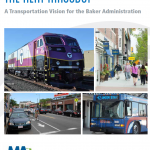The Next MASSDOT
A Transportation Vision for the Baker Administration
Massachusetts is at a pivotal moment with regard to transporation. In recent year, the Commonwealth has taken the first steps toward reversing the transportation system's long slide into debt and decay. Long-awaited reforms to transportation agencies are under way. Long-deferred projects to repair and modernize our transportation system are finally moving forward.
Downloads
MASSPIRG Education Fund

Massachusetts is at a pivotal moment with regard to transportation. In recent years, the Commonwealth has taken the first steps toward reversing the transportation system’s long slide into debt and decay. Long-awaited reforms to transportation agencies are under way. Long- deferred projects to repair and modernize our transporta- tion system are finally moving forward.
Over the next four years, the Baker Administration will make important decisions that will shape the future of transportation in Massachusetts, as well as our economy as a whole. By addressing the Commonwealth’s trans- portation challenges and taking advantage of emerging opportunities, Gov. Baker can lay a foundation for eco- nomic growth and improved quality of life that can yield benefits for years to come.
Transportation: Moving Massachusetts’ Economy
• Massachusetts’ economic success is increasingly built on our ability to attract and retain skilled workers
in knowledge-based industries – workers who are increasingly drawn to walkable neighborhoods with good public transportation. Transportation invest- ments open up new areas for development, help our Gateway Cities make the most of their natural advan- tages, and expand the number of people with access to quality jobs.
• A healthy Massachusetts is a productive Massachusetts.
Smart investments can expand access to healthy trans- portation choices such as biking and walking, while reducing health-threatening pollution and greenhouse gas emissions.
• Maintaining our roads, bridges and transit systems reduces congestion, delays and breakdowns today and saves money in the long run. Investing in main- tenance now is a smart fiscal move for Massachusetts and one that keeps our transportation system running smoothly.
By making smart transportation policy choices, the Baker Administration can continue moving
Massachusetts along the path of reinvestment and reform.
1) Continue reforms by making every dollar count.
Massachusetts must direct limited taxpayer dollars to investments that improve economic competitiveness, enhance public health and safety, and reduce climate pollution. States across the country, led by governors of both political parties, have moved away from subjective, politically driven transportation planning to rigorous,
data-driven systems that prioritize transportation projects based on the benefits they can deliver.
In 2013, the Legislature took a key step on the path to reform by creating the Project Selection Advisory Council, which will recommend a transparent, data-driven system for prioritizing transportation projects by mid-2015. The Baker Administration should adopt project selection crite- ria that align Massachusetts’ transportation investments with the Commonwealth’s top economic, environmental, social equity, and health priorities.
3) Close the transportation funding gap.
Even with the infusion of about $600 million per year in new funding from the 2013 Transportation Finance Act, Massachusetts is still struggling just to emerge from a legacy of infrastructure neglect and mounting debt, never mind make the new investments that can unlock economic opportunity in Massachusetts in the years to come. Making those investments, while at the same time putting Massachusetts’ transportation system on a sound fiscal footing, will require new revenue.
Experts indicate that Massachusetts will need roughly an additional $500 million to $600 million per year to return our transportation system to a state of good repair while making high-leverage investments in new transportation infrastructure. The Baker Administration should prioritize working with the Legislature to identify new sources of transportation revenue to close that gap.
2) Expand transportation choices for Massachusetts residents.
People increasingly want to live in places with a variety of transportation choices. If Massachusetts is to position it- self well for economic success in the 21st century, expand- ing access to transit, bicycling and walking must be a top priority. In 2012, MassDOT adopted the goal of tripling the amount of travel taking place by transit, bicycling and walking by 2030. This “mode shift goal” provides a strategic vision and direction for the Commonwealth’s
